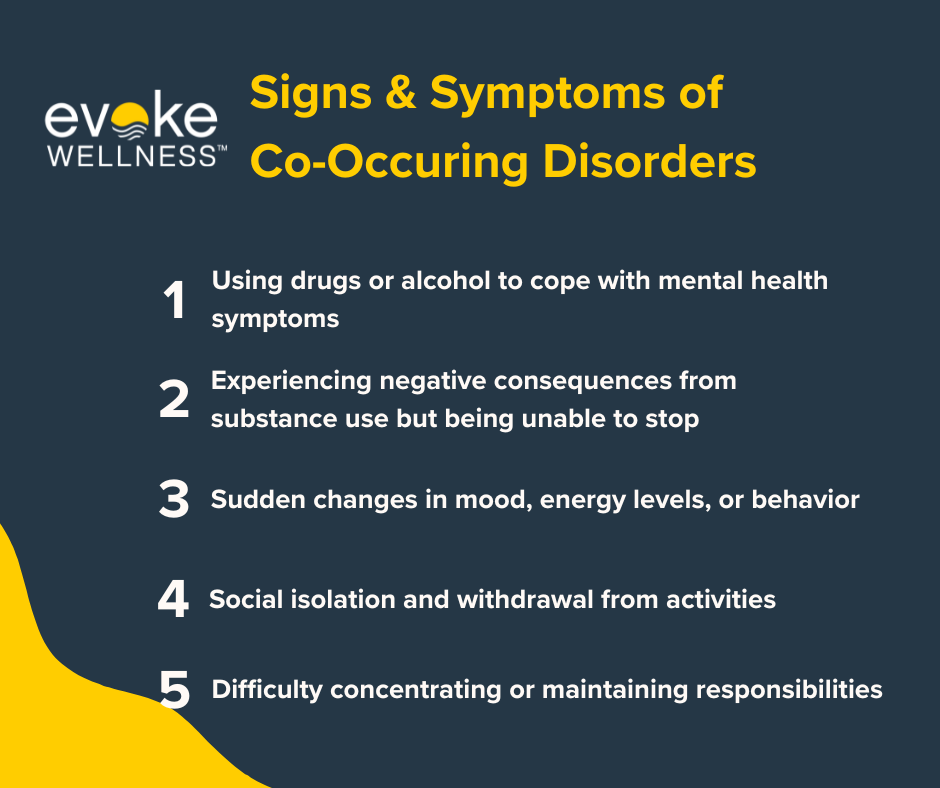If you or a loved one struggles with both substance abuse and mental health issues, you’re not alone. According to the Substance Abuse and Mental Health Services Administration, nearly 9.5 million American adults experienced co-occurring disorders in 2019. This complex condition, known as dual diagnosis, requires specialized treatment to address both the addiction and underlying mental health concerns simultaneously. By taking a holistic approach, we help clients achieve lasting recovery and improved overall well-being. Learn how our expert team can support your journey to wellness.
Together, let’s embrace the journey to recovery and the promise of a new beginning. Call us at (833) 949-1347 today or reach out online.
Understanding Dual Diagnosis and Co-Occurring Disorders
What is Dual Diagnosis?
A dual diagnosis refers to the coexistence of a substance use disorder (SUD) and a mental health disorder. These conditions often interact and influence each other, making treatment more complex. Common mental health issues seen in dual diagnosis include depression, anxiety, bipolar disorder, PTSD, ADHD, and personality disorders.
Prevalence and Impact
Individuals with mental health conditions are up to 4 times more likely to develop an SUD. Conversely, those with SUDs have high rates of co-occurring mental disorders. This link is significant, as untreated dual diagnosis can worsen both conditions and lead to negative consequences like job loss, financial problems, and relationship issues.

Need for Integrated Treatment
Treating only one condition while ignoring the other is often ineffective, as the two disorders can exacerbate each other in a vicious cycle. Dual diagnosis treatment programs are designed to address both issues simultaneously through a combination of therapies, medications, and support services tailored to each individual’s unique needs.
The Prevalence of Co-Occurring Disorders
Co-occurring mental health and substance use disorders are alarmingly common. According to a study, eating disorders often co-occur with conditions like depression, anxiety, and substance abuse. This underscores the critical need for comprehensive dual diagnosis treatment.
High Rates of Dual Diagnosis
Studies show the rates of co-occurring disorders are staggeringly high. An estimated 9% of the U.S. population suffers from an eating disorder, which frequently overlaps with other psychiatric issues. Similarly, drug addiction in Ohio has reached crisis levels, with overdose rates far exceeding national averages.
Complexities of Treatment
Treating co-occurring disorders is highly complex. Underlying mental health conditions can drive substance abuse, while drugs like MDMA can induce psychiatric symptoms. Effective care requires specialized dual diagnosis programs addressing the intricate interplay between disorders.
Integrated, Evidence-Based Approach
The most successful treatment combines evidence-based therapies targeting both substance use and mental health. This integrated approach utilizes cognitive-behavioral therapy, dialectical behavior therapy, medication, and family counseling. By treating co-occurring issues concurrently, patients achieve lasting recovery and sobriety.
Signs You May Need Detox for Dual Diagnosis Treatment
Physical Dependence
One of the clearest signs that detox may be necessary is experiencing physical withdrawal symptoms when stopping substance use. This can include nausea, sweating, tremors, insomnia, and more – indicating your body has become physically dependent on drugs or alcohol. Increased tolerance, where higher doses are needed to achieve the desired effects, is another red flag.
Psychological Struggles
Beyond physical dependence, certain psychological and behavioral changes can signal the need for professional detox treatment. Neglecting important responsibilities at work, school or home due to substance abuse is a warning sign. Strained relationships with loved ones as a result of your addiction is another indicator that it’s time to seek help.
Unsuccessful Attempts
Persistent withdrawal symptoms that persist even after multiple attempts to quit on your own are a clear sign that medically supervised detox is required. Attempting to detox alone can be extremely dangerous and often leads to relapse – making a professional program the safer, more effective option.
Mental Health Concerns
If you’re experiencing unresolved mental health issues alongside substance abuse, this points to a potential dual diagnosis requiring specialized treatment. Signs include using substances to cope with emotions, a history of mental illness, suicidal/violent thoughts when quitting, and dramatic mood changes.
A medical detox program offers comprehensive benefits, including safe withdrawal management, addressing co-occurring disorders through dual diagnosis treatment, and a smooth transition to further addiction care. If you recognize these signs, detox could be the crucial first step towards lasting recovery.
Our Approach to Detox for Dual Diagnosis
Comprehensive Treatment
At Evoke Wellness, we understand the complex interplay between substance abuse and mental health disorders. Our approach to detox for dual diagnosis involves a comprehensive, integrated treatment plan that addresses both issues simultaneously. We utilize evidence-based therapies like cognitive-behavioral therapy (CBT) and dialectical behavior therapy (DBT), combined with holistic activities like yoga and meditation, to promote healing of the mind, body, and spirit. According to a study by Stanford’s Human-Centered AI group, a holistic approach can significantly improve treatment outcomes for individuals with co-occurring disorders.
Tailored Treatment Plans
Our team of experienced professionals works closely with each individual to develop a personalized treatment plan tailored to their unique needs. We understand that no two cases are alike, and our approach reflects this. For those struggling with substance abuse and mental health conditions like PTSD, bipolar disorder, or anxiety, we provide specialized care and support. Our mental health treatment programs aim to help patients stabilize their mental health, develop healthy coping mechanisms, and achieve lasting recovery from addiction.
Safe, Medically-Supervised Detox
The first stage of our dual diagnosis treatment involves medically-supervised detox to manage withdrawal symptoms safely. Our trained staff closely monitors vital signs and prescribes medications as needed to ease cravings, anxiety, and other physical effects of stopping substance use. As explained in our blog on cocaine detox, this initial phase is crucial in stabilizing individuals before they can fully engage in therapy and counseling.
With our comprehensive approach to detox for dual diagnosis, we strive to provide a supportive, compassionate environment that addresses the unique challenges of co-occurring disorders and sets the foundation for lasting recovery.
Receiving Integrated Treatment for Dual Diagnosis
Addressing Co-occurring Disorders
For individuals struggling with both a substance use disorder and a mental health condition, it’s crucial to receive integrated treatment addressing both issues simultaneously. Dual diagnosis treatment programs provide comprehensive care tailored to the unique challenges of co-occurring disorders.
These specialized programs combine evidence-based therapies from both substance abuse and mental health treatment modalities. This integrated approach increases the chances of successful long-term recovery by tackling the root causes and interconnected nature of dual diagnosis.
Continuum of Care
An effective dual diagnosis program offers a full continuum of care. It often begins with medically supervised detox to safely manage withdrawal symptoms. From there, patients transition into residential or intensive outpatient treatment.
Psychotherapy, counseling, and support groups help uncover underlying issues fueling the disorders. Medications may be used to alleviate mental health symptoms when appropriate. Family education empowers loved ones to provide a supportive environment throughout the recovery journey.
Personalized Treatment Plans
No two cases of dual diagnosis are exactly alike. Reputable treatment centers develop personalized plans based on thorough assessments. They consider factors like:
- Types of substances abused
- Severity of addiction and mental illness
- Co-occurring medical conditions
- Personal history and life circumstances
Customized care increases engagement and positive outcomes by directly addressing the individual’s unique needs.
Relapse Prevention Strategies
Relapse is common with dual diagnosis, making relapse prevention a key focus. Patients learn coping mechanisms, trigger identification, and lifestyle changes to maintain sobriety. Long-term aftercare support is vital, including sober living arrangements, 12-step programs, and ongoing therapy.
With comprehensive, integrated treatment addressing every aspect of co-occurring disorders, individuals can break the cycles of addiction and mental illness to rebuild healthy, fulfilling lives.
Finding the Right Dual Diagnosis Treatment Center
Selecting the ideal dual diagnosis treatment program is crucial for individuals struggling with co-occurring substance abuse and mental health disorders. It requires a comprehensive approach that addresses both conditions simultaneously using evidence-based therapies.
Assessing Needs
The first step is to evaluate your specific needs and circumstances. Consider the severity of your addiction, the type of mental health disorder you’re experiencing (such as depression, anxiety, bipolar disorder, or PTSD), and any additional medical or personal factors that may impact your treatment.
- Assess the range of services offered by potential treatment centers to ensure they cater to your unique requirements.
- Look for programs that provide individualized treatment plans tailored to your specific dual diagnosis.
Treatment Approach
Effective dual diagnosis treatment centers should offer an integrated approach combining psychotherapy, counseling, and, if necessary, medication management. According to Evoke Wellness, this holistic approach is essential for promoting emotional well-being and achieving lasting sobriety.
- Inquire about the center’s therapeutic modalities, such as cognitive-behavioral therapy (CBT), dialectical behavior therapy (DBT), or trauma-focused therapies.
- Ensure the program addresses both substance abuse and mental health disorders concurrently, as treating only one condition may hinder long-term recovery.
Support Services
Beyond clinical treatment, consider the additional support services provided by the treatment center. These can play a vital role in your overall recovery journey.
- Look for centers that offer aftercare planning, sober living arrangements, and ongoing support groups.
- Evaluate the quality of the facility’s amenities, such as comfortable living spaces, recreational activities, and nutritious meal options.
By thoroughly researching and assessing potential dual diagnosis treatment centers, you can increase your chances of finding a program that aligns with your specific needs, ensuring a comprehensive and effective path to lasting recovery.
FAQ: What is the Best Detox for Dual Diagnosis?
Comprehensive Integrated Treatment
For individuals struggling with both substance abuse and co-occurring mental health disorders, known as a dual diagnosis, comprehensive integrated treatment programs are highly recommended. Detox alone is often not enough to address the complex interplay of addiction and underlying mental health issues like depression, anxiety, or PTSD.
According to research from Stanford’s Human-Centered AI group, detox combined with ongoing therapy, counseling, and support leads to better outcomes in achieving lasting recovery. This approach targets the root causes driving addictive behaviors and provides essential coping mechanisms.
Dual Diagnosis Treatment Programs
Dual diagnosis treatment programs are designed to simultaneously address substance abuse and mental health conditions in an integrated, holistic manner. These programs incorporate evidence-based therapies like cognitive-behavioral therapy (CBT) and dialectical behavior therapy (DBT), as well as medication management when appropriate.
As noted by Evoke Wellness Ohio, these specialized programs aim to help patients heal physically, mentally, and emotionally, equipping them with relapse prevention skills for long-term sobriety.
Inpatient vs. Outpatient Options
Inpatient or residential rehabilitation centers offer a structured, 24/7 environment conducive to focused recovery. This immersive setting allows individuals to step away from triggers and stressors while receiving intensive, round-the-clock care and support.
For those requiring more flexibility, outpatient programs like intensive outpatient treatment (IOP) and medication-assisted treatment (MAT) can also be effective options. These programs provide a high level of accountability and support while allowing patients to live at home and maintain certain responsibilities.
Conclusion
Seeking help for co-occurring disorders is a critical step toward recovery and improved quality of life. By addressing both substance abuse and mental health issues simultaneously through a comprehensive dual diagnosis treatment program, you can achieve lasting healing and wellness.
Recent studies show that over 50% of individuals with substance use disorders also have co-occurring mental health conditions. With proper treatment, however, recovery rates improve significantly. Don’t wait to get the help you need and deserve. Reach out to a qualified dual diagnosis treatment center today to start your journey toward a healthier, more fulfilling life free from addiction and mental health struggles.
Begin Your Journey with Evoke Wellness at Hilliard
If you or a loved one is considering treatment, Evoke Wellness at Hilliard invites you to contact us. Our compassionate team is ready to answer your questions, discuss your needs, and help you take the first steps toward recovery. In Hilliard, you’ll find more than just a treatment program – you’ll discover a community dedicated to your wellness and success. Together, let’s embrace the journey to recovery and the promise of a new beginning. Call us at (833) 949-1347 today or reach out online.



